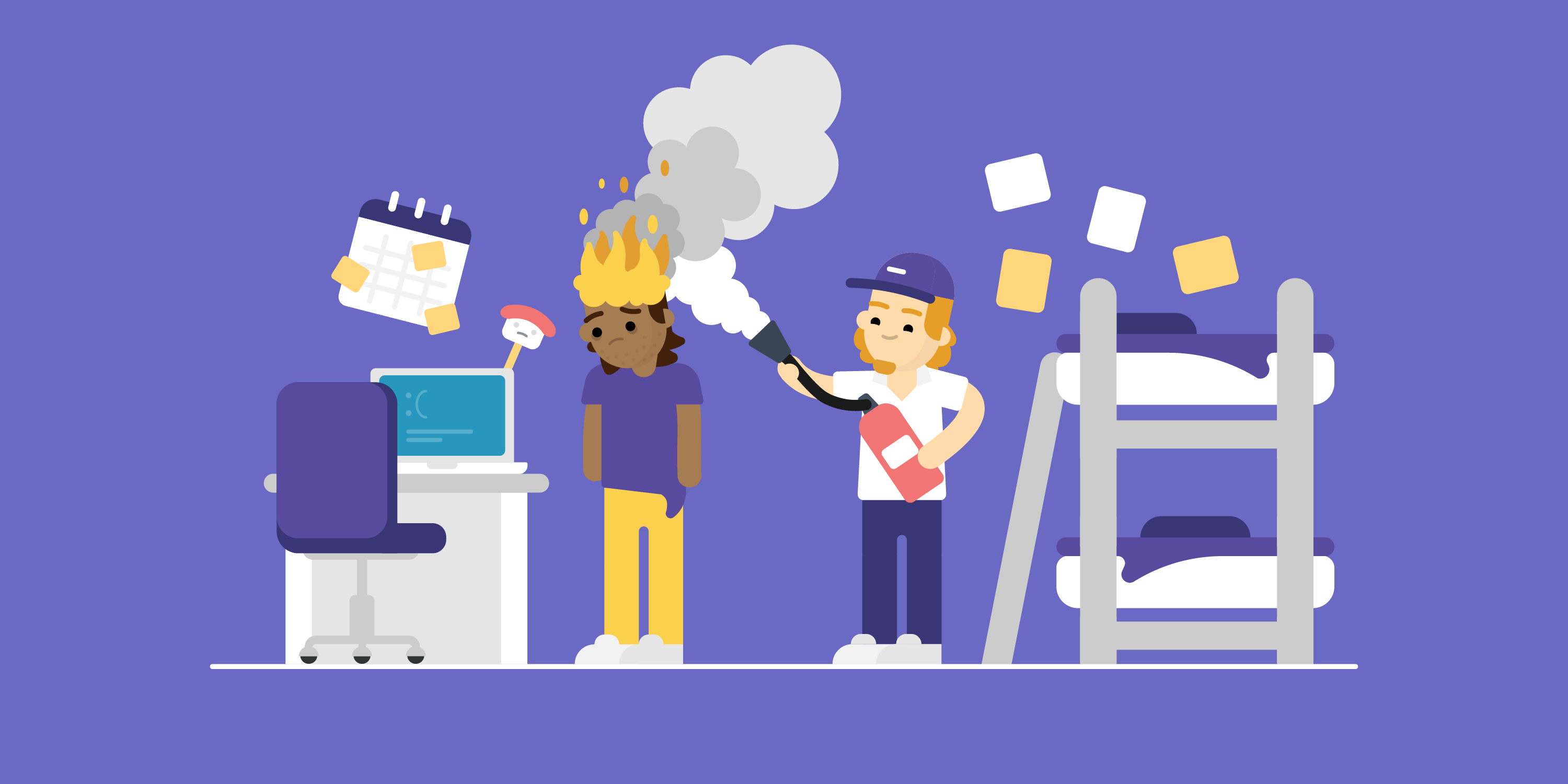
College is fun and exciting - and yet, it’s also a source of stress for many students.
On top of handling tons of assignments, you might also have to deal with moving out of your hometown, finding affordable accommodation, having difficult roommates, and building a new social circle…
And, let’s not forget, student debt.
Sometimes, such stress can build up and eventually lead to student burnout.
Luckily, we’re here to tell you all about managing and preventing student burnout so that you can make the most out of your college experience!
So, in this article, we will cover:
- 5 Symptoms of Student Burnout
- 3 Ways to Cope With Student Burnout
- 5 Ways to Recover From Student Burnout
- 10 Tips to Avoid Student Burnout Altogether
And more!
What Is Student Burnout?
Simply put, student burnout is a type of burnout that results from prolonged periods of school-related stress.
Although burnout is widely known as an occupational phenomenon, students aren’t immune to burnout.
Some of the most common triggers of student burnout include:
- Having a heavy academic workload.
- Moving out from your home.
- Choosing a major.
- Receiving lower grades than usual.
- Competing with peers.
- Struggling to find a college job.
- Losing friends from home.
- Struggling to make new friends in college.
- Having issues with the accommodation.
- Trying to get an internship.
- Feeling isolated due to remote learning.
- Failing at managing money.
- Struggling with student debt.
Left unmanaged, student burnout can lead to depression, physical illnesses, and dropping out of college. For this reason, it’s important to spot student burnout as quickly as possible and take the necessary measures to treat it.
5 Symptoms of Student Burnout
Student burnout shares many similarities with workplace burnout, including the following three main symptoms:
- Exhaustion
- Decreased productivity
- Cynicism
That said, student burnout also has a set of distinct symptoms that can help you easily recognize if you’re suffering from it.
So, here are the 5 most common symptoms of student burnout you should look out for:
#1. Lack of Motivation and Interest
Decreased motivation and interest are often the first sign of student burnout. Most commonly, this symptom manifests as a decreased interest in your studies.
For example, you may have dreamed of becoming a lawyer since middle school - and yet, you no longer feel excited and happy pursuing your dream. You might be skipping classes, sleeping in, and procrastinating until the last minute.
You may also start questioning if you’re on the right path, which can lead you to consider changing your major or dropping out altogether.
That said, the lack of motivation and interest can also stretch far beyond your studies. For example, you may no longer be interested in extracurricular activities and social events.
Generally speaking, if you feel like you’ve lost your drive and enthusiasm toward your academic goals and social activities, you may be experiencing student burnout.
#2. Trouble Focusing
Have you ever read the same sentence over and over again only to realize you have no idea what you just read?
Well, student burnout may certainly be one of the reasons.
Trouble focusing is a common issue among many students commonly linked to stress, anxiety, and a lack of sleep.
So, if you’ve become more forgetful, indecisive, and less productive lately, it may be a good indicator of student burnout.
#3. A Decline in Physical Health
While getting one cold after another may seem more of an inconvenience than a big deal, it might be a symptom of student burnout.
Studies show that burnout directly correlates with physical illness - and, the more severe the burnout, the more severe physical symptoms people experience.
Most commonly, student burnout can cause the following physical illnesses (which you should get examined by your doctor, of course):
- Digestive problems
- Skin rashes
- Tension headaches
- Sleep disorders
- Flu, common cold, and other respiratory illnesses
As such, it’s important that you don’t ignore the warning signs of student burnout, as it can affect both your mind and your body.
#4. Lack of Creativity
Student burnout can also manifest as a lack of creativity.
For example, if you’re studying engineering, you may be struggling to find solutions for problem-solving tasks.
Or, if you’re studying something creative, such as writing or marketing, you may feel a lack of inspiration and original ideas.
In general, if your thinking process seems to have slowed down and you feel like nothing you produce is good enough, you may be experiencing student burnout.
#5. Reduced Academic Performance
Whether it’s because of a lack of motivation, inability to focus and think creatively, or physical health issues, getting lower grades than usual is a key sign of student burnout.
You should also keep in mind that student burnout can differ from student to student. While some students procrastinate and skip classes, others hyperfocus on their performance, leading to overworking and pulling consecutive all-nighters.
However, no matter the time and effort you put into your studies, one thing is for sure - student burnout can leave you mentally, emotionally, and physically drained, which eventually impacts your academic performance.
3 Ways to Cope With Student Burnout
Luckily, student burnout isn’t all that difficult to overcome if you know exactly how to do it.
So, here are the 3 most effective ways to cope with student burnout, also known as the 3 Rs - recognition, reversal, and resilience:
#1. Recognize
If any of the above-mentioned symptoms hit too close to home, don’t be alarmed - recognition is the first step of managing student burnout, so you’re on the right track.
Whether you’ve become more irritable or started sleeping longer, it’s important that you take note of any changes in your mental, physical, and emotional states. The earlier you notice you’re burning out, the easier it is to cope with it.
#2. Reverse
Once you recognize that you may be struggling with student burnout, it’s time to reverse the damage with healthy coping strategies.
Here are some examples of effective coping strategies:
- Seeking help. Depending on your symptoms, you can seek help from your parents, general practitioner, friends, college counselor, or mentor.
- Meditation. Meditation calms your mind and grounds you. Because of this, it’s ideal for students that experience high levels of stress and anxiety.
- Breaks. If you can take time off from college, use it to recover from student burnout. If not, make sure to take regular breaks throughout the day to avoid overworking.
- Hobbies. Spending time on something that brings you joy, especially creative and physical activities, can help you effectively cope with student burnout.
#3. Build Resilience
Once you’ve recognized and reversed student burnout, it’s crucial to build your resilience.
Some methods that can help you cope with stress better include:
- Gratitude. Expressing gratitude helps you generate positive emotions and train your mind to see the silver lining in every situation.
- Socializing. Student burnout can often leave you isolated. As such, developing stronger social bonds with your peers, friends, and family can help you effectively manage stress and avoid becoming overwhelmed.
- Journaling. Setting time aside each day to journal can help you know yourself better. What’s more, you can record your achievements to boost motivation and develop a sense of accomplishment.
5 Ways to Recover From Student Burnout
Once you’ve taken the steps to manage student burnout, it’s important to fully recover from it.
So, here are 5 tips that will help you recover from student burnout as quickly as possible:
- Create a daily routine. Developing your time management skills can speed up your student burnout recovery, so make sure to follow a routine. Not to mention, having some structure in your life can make you feel more in control, organized, and motivated.
- Adopt a healthy lifestyle. Student burnout wears out your body AND your mind. As such, you might benefit from adopting a healthy lifestyle that includes plenty of rest, nutritious meals, 8 glasses of water, and at least 30 minutes of physical activity per day.
- Learn to say ‘no.’ As a college student, you have plenty of academic and social opportunities. However, it’s important to learn to prioritize your activities. Sometimes, it’s worth declining activity for the sake of recharging.
- Get your priorities straight. Of course, college is important. But, let’s be honest, being productive is nearly impossible when you’re burned out. So, make sure to prioritize your health, relationships, and overall well-being until you fully recover from student burnout.
- Practice sleep hygiene. Being well-rested facilitates student burnout recovery. So, aim to develop healthy sleep habits, such as turning off all devices at least an hour before sleep, ventilating your bedroom, and using blackout curtains.
10 Tips to Avoid Student Burnout Altogether
You’ve probably heard the phrase “prevention is better than cure” - well when it comes to student burnout, it couldn’t be more true.
So, here are 10 foolproof tips that will help you avoid student burnout altogether:
- Don’t compare yourself to others. Comparing your performance and grades to others can make you lose confidence and induce anxiety, which can lead to student burnout.
- Follow your passions. Choosing a study field that interests and excites you can keep you motivated, thus minimizing the risk of student burnout.
- Listen to yourself. To avoid student burnout, make sure not to push yourself beyond your limits.
- Ask for deadline extensions. Don’t forget that your professors are human, too - chances are, if you ask for a deadline extension in advance, they won’t be against it (as long as you don’t make a habit out of it).
- Don’t ignore the warning signs. If you notice any changes in your body or mind, take them seriously before they blow up into a bigger problem.
- Set realistic goals. Setting reasonable goals and expectations for yourself can effectively help you avoid overworking, disappointment, and student burnout.
- Cancel your plans. If you need to rest, don’t hesitate to cancel your plans to recharge. After all, participating in social activities is much more fun when you’re well-rested and energetic.
- Break down your assignments. Large assignments can make you feel overwhelmed, so make sure to split them into smaller, manageable tasks.
- Make time for yourself. No matter how busy your day is, make sure to set aside at least 30 minutes for personal activities that make you feel better.
- Avoid procrastination. Having to do dozens of tasks at the last minute can easily lead to student burnout, so try your best to stop procrastinating.
Digital Burnout: 5 Warning Signs
With education rapidly moving online, it’s not unusual for students to experience digital burnout.
Simply put, digital burnout is a type of burnout that’s caused by the intense usage of digital devices, including smartphones, laptops, and tablets.
Here are 5 warning signs that you may be at risk of experiencing digital burnout:
- You feel restless and have trouble falling or staying asleep.
- You feel anxious when you receive notifications and have an urge to instantly reply to messages.
- You lack the energy to perform everyday tasks.
- You experience physical symptoms, such as neck pain and headaches.
- You’re unable to unplug and spend most of your day online.
Ultimately, limiting your screen time is the most effective way to both avoid and fight digital burnout. Here are some ways you can do it that are proven to work:
- Set aside specific times during the day to check your email and social media.
- Spend time with your friends, family, and colleagues in person, without using any electronic devices.
- If you have a habit of scrolling social media or watching TV before going to sleep, improve your sleep quality by reading books, journaling, knitting, or meditating instead.
Conclusion
And that sums up everything you need to know about student burnout.
Hopefully, now you know exactly how to recognize student burnout and effectively cope with it. What’s more, now you should have a clear idea of how to avoid burning out altogether!
Just in case you need a quick recap, here are the most important points we covered in this article:
- Student burnout is a type of burnout that comes from extended academic stress.
- The main symptoms of student burnout include a lack of motivation and interest, impaired ability to focus, physical health issues, lack of creativity, and decreased academic performance.
- To effectively cope with student burnout, you should recognize it, reverse it, and build resilience.
- Learning to say ‘no’, following a daily routine, and prioritizing your health are some of the ways that can help you recover from student burnout.
- Setting reasonable goals, knowing your limits, making time for yourself, and asking for deadline extensions are among the most effective ways of avoiding student burnout.
- Restlessness, anxiety, and a lack of energy can indicate digital burnout.



